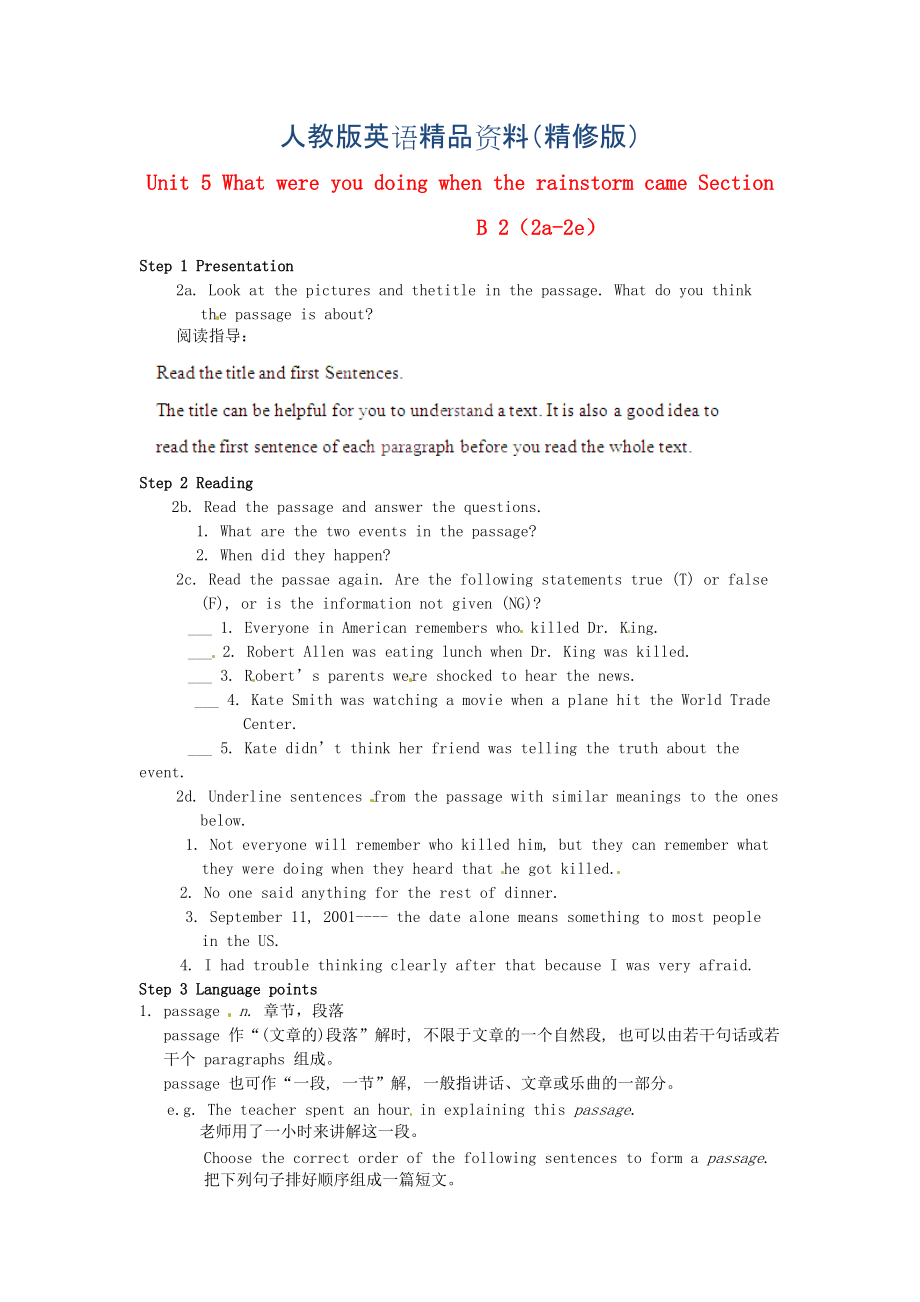《【人教版新目標(biāo)】八年級(jí)英語(yǔ)下冊(cè)Unit 5 What were you doing when the rainstorm came Section B 22a2e精修版》由會(huì)員分享����,可在線閱讀,更多相關(guān)《【人教版新目標(biāo)】八年級(jí)英語(yǔ)下冊(cè)Unit 5 What were you doing when the rainstorm came Section B 22a2e精修版(3頁(yè)珍藏版)》請(qǐng)?jiān)谘b配圖網(wǎng)上搜索��。
1�、人教版英語(yǔ)精品資料(精修版)
Unit 5 What were you doing when the rainstorm came Section B 2(2a-2e)
Step 1 Presentation
2a. Look at the pictures and thetitle in the passage. What do you think the passage is about?
閱讀指導(dǎo):
Step 2 Reading
2b. Read the passage and answer the questions.
1. What are the two even
2、ts in the passage?
2. When did they happen?
2c. Read the passae again. Are the following statements true (T) or false (F), or is the information not given (NG)?
___ 1. Everyone in American remembers who killed Dr. King.
___ 2. Robert Allen was eating lunch when Dr. King was killed.
___ 3. Rober
3��、t’s parents were shocked to hear the news.
___ 4. Kate Smith was watching a movie when a plane hit the World Trade Center.
___ 5. Kate didn’t think her friend was telling the truth about the event.
2d. Underline sentences from the passage with similar meanings to the ones below.
1. Not everyone
4、 will remember who killed him, but they can remember what they were doing when they heard that he got killed.
2. No one said anything for the rest of dinner.
3. September 11, 2001---- the date alone means something to most people in the US.
4. I had trouble thinking clearly after that because I w
5���、as very afraid.
Step 3 Language points
1. passage n. 章節(jié)����,段落
passage 作“(文章的)段落”解時(shí), 不限于文章的一個(gè)自然段, 也可以由若干句話或若干個(gè) paragraphs 組成��。
passage 也可作“一段, 一節(jié)”解, 一般指講話���、文章或樂(lè)曲的一部分�。
e.g. The teacher spent an hour in explaining this passage.
老師用了一小時(shí)來(lái)講解這一段�����。
Choose the correct order of the following sentenc
6��、es to form a passage.
把下列句子排好順序組成一篇短文�。
2. My parents were completely shocked!
completely adv. 徹底地,完全地
e.g. I understand completely. 我完全明白�。
shocked adj. 驚愕的;受震驚的
e.g. She was so shocked that she could hardly say a word.
她大為震驚�,幾乎一句話也說(shuō)不出來(lái)�����。
[即學(xué)即練] 翻譯下列句子。
1) 看到鄰居那樣對(duì)待孩子我很驚愕����。
2) 他對(duì)
7、她抽煙感到很震驚����。
3. My parents did not talk after that, and we finished the rest of our dinner in silence.
in silence 沉默,無(wú)聲
without speaking or making a sound; silently
e.g. Many patients were waiting in silence.
許多病人在靜靜地等候著����。
A hundred and fifty reporters sat in silence.
在場(chǎng)的150名
8、記者靜靜地坐在那里����。
4. I didn’t believe him at first.
at first “起初,首先”����,作為介詞短語(yǔ),只起副詞作用(在句中用作狀語(yǔ))�。 at first主要用于強(qiáng)調(diào)前后對(duì)照,暗示接下去的動(dòng)作與前面的動(dòng)作不同甚至相反�,因此常有 but, afterwards, soon, at last 等相呼應(yīng)�����。
e.g. At first we used hand tools. 首先我們使用手工工具����。
At first I didn’t want to go, but soon I changed my mind.
我開(kāi)始不想去�����,但我很快就改變了主意���。
9�、
Step 4 Speaking
2e. How much do you remember about the events in the passage? Test your partner.
A: When did Dr. Martin Luther King die?
B: He died on …
Step 5 Summary
Step 6 Homework
1. Remember the words and phrases in this lesson.
2. Finish the exercises in the workbook.
 【人教版新目標(biāo)】八年級(jí)英語(yǔ)下冊(cè)Unit 5 What were you doing when the rainstorm came Section B 22a2e精修版
【人教版新目標(biāo)】八年級(jí)英語(yǔ)下冊(cè)Unit 5 What were you doing when the rainstorm came Section B 22a2e精修版

